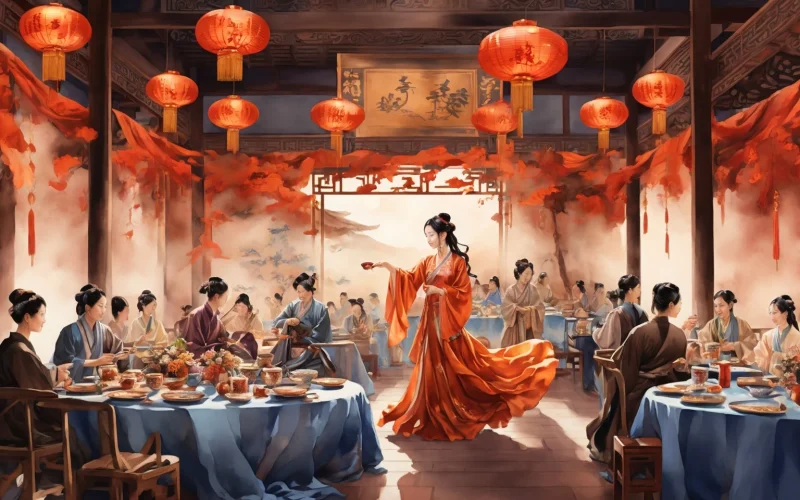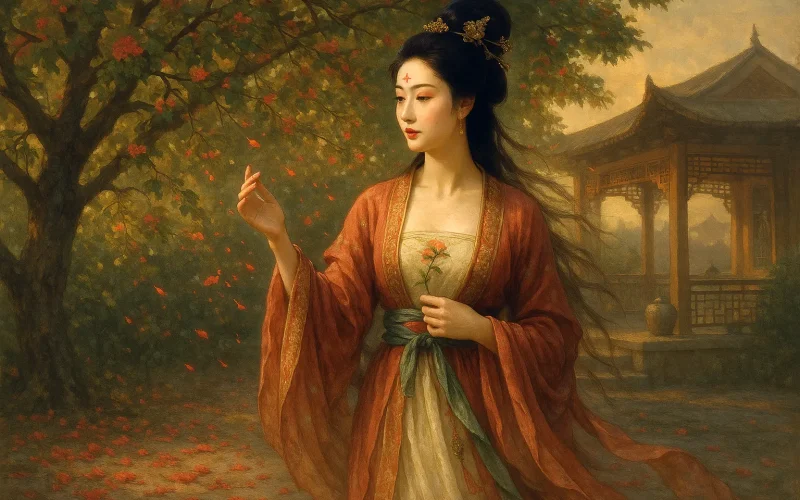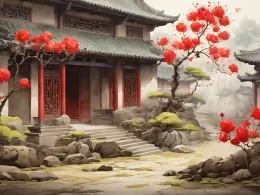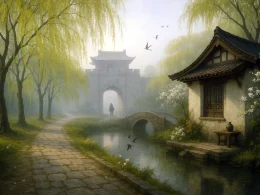A glazed cup full of amber wine,
The strong drink drips like red pearls fine.
The dragon boiled and phoenix roasted would weep;
The fragrant breeze blows into broidered curtains deep.
The dragon flute is played;Beaten the drums covered with alligator's skin.
The songstress sings with teeth as bright as jade,
And dancers dance with waist as slender as hairpin.
The prime of your life like the sun on the decline,
Peach blossoms fall pell-mell like rain of petals pink.
So I advise you to get drunk with wine.
When buried in the grave, what could you take to drink?
Original Poem:
「将进酒」
李贺
琉璃钟,琥珀浓,小槽酒滴真珠红。
烹龙炮凤玉脂泣,罗帏绣幕围香风。
吹龙笛,击鼍鼓;皓齿歌,细腰舞。
况是青春日将暮,桃花乱落如红雨。
劝君终日酩酊醉,酒不到刘伶坟上土!
Interpretation:
This poem, through its vivid visual and auditory depictions, presents a grand banquet scene, full of extravagance. However, as the joyfulness is portrayed, it gradually leads into a profound reflection on the fleeting nature of life and the passage of time, creating a striking contrast. This contrast reveals the poet's inner conflict and contemplation on life.
First Couplet: “琉璃钟,琥珀浓,小槽酒滴真珠红。”
“The chime of the glass bell rings, the wine is as rich as amber, and drops from the small spout like pearls of red.”
These lines use elaborate descriptions to portray the wine and objects at the banquet, creating an opulent scene full of color. The comparisons of "glass bell," "amber," and "pearl-red" emphasize the luxurious atmosphere of the feast.
Second Couplet: “烹龙炮凤玉脂泣,罗帏绣幕围香风。”
“Dragon and phoenix delicacies are cooked, with jade fat weeping like tears, and the embroidered curtains surrounded by fragrant winds.”
By describing the banquet's food and intricate decorations, this couplet reflects the grandeur of the feast. The juxtaposition of the weeping jade fat and the fragrant winds conveys a subtle emotion, suggesting that even the most lavish of scenes carries a tinge of sorrow.
Third Couplet: “吹龙笛,击鼍鼓;皓齿歌,细腰舞。”
“Blowing the dragon flute, beating the drum; the bright teeth sing, the slender waist dances.”
This couplet captures the lively atmosphere of the banquet with rhythmic instruments and dance movements. The beauty of the music and dance brings vibrancy to the scene, expressing the poet's pursuit of fleeting joy in life.
Fourth Couplet: “况是青春日将暮,桃花乱落如红雨。”
“As youth nears its twilight, peach blossoms fall like red rain, and the spring fades.”
These lines describe the changing of seasons and the passing of youth. By using the image of "peach blossoms falling," the poet cleverly combines the fleeting nature of time and life, reflecting on the inevitability of aging and the impermanence of youth.
Fifth Couplet: “劝君终日酩酊醉,酒不到刘伶坟上土!”
“I urge you to drink yourself into a stupor all day, but the wine can never reach the grave of Liu Ling.”
This line references the story of Liu Ling, a famed wine-drinker, to reflect the poet's profound awareness of life's transience. While wine may temporarily numb the mind, it cannot offer solace in death, marking a shift from the banquet's joy to a deep contemplation on life and death.
Writing Features:
The writing style of this poem exhibits Li He’s typical traits of grandeur, brilliance, and sorrow. Li He is skilled in using vivid imagery and elaborate depictions to express the complexity of human emotions, and this poem precisely reflects his profound insights into the contradiction between luxury and mortality.
- Lavish Descriptions
The poet uses numerous ornate words to describe the banquet scene, such as “glass bell,” “amber,” and “pearl-red,” creating a vivid, colorful image. These details not only present the opulence of the feast but also convey an emotional expression. The opening lines create a strong sensory impact. - The Relentless Passage of Time
Li He masterfully uses the scene of falling peach blossoms to symbolize the passage of time and the fleeting nature of youth. The image of “peach blossoms falling like red rain” not only depicts nature but also carries the poet’s reflections on the brevity of life and the inevitability of aging. - Dramatic Contrast and Turn
The poem's ending shifts dramatically from the lavish celebration to a profound reflection on death, creating an emotional contrast. By referencing the story of Liu Ling's death, the poet delivers a powerful message, compelling readers to reflect on the brevity of life and the certainty of death. This contrast deepens the philosophical nature of the poem, intensifying its emotional complexity. - Use of Omission and Symbolism
Many of the objects in the poem are presented through omission, like the “glass bell” and “amber,” without connecting verbs. This allows the reader to engage in more imagination and interpretation. This technique enhances the poem's expressive power, increasing its emotional impact, and showcasing the poet’s unique artistic style.
Overall Appreciation:
This poem, through its depiction of a lavish banquet, presents a scene filled with vibrancy and sensory stimulation. However, behind this extravagance, the poet subtly introduces the theme of the passage of time and life's brevity. The early depiction of luxury and joy is shifted toward a deep contemplation on death, with the final reference to “the wine not reaching Liu Ling’s grave” highlighting the impermanence of life. Through this poem, Li He expresses his sensitivity to the fleeting nature of life and time, revealing the strong contrast between luxury and sorrow, life and death. The poem is a profound reflection of the poet's inner turmoil and indignation.
Insights:
This poem blends the extravagant banquet with the themes of life, death, and the passage of time. Through the depiction of the feast, the poet gradually leads into a contemplation on the fleeting nature of life and the ruthless passage of time. Through exquisite artistic techniques and rich imagery, the poet conveys a deep sense of sensitivity toward life’s impermanence. The banquet’s splendor and joy do not alleviate the poet’s inner loneliness and anxiety; rather, they emphasize the inevitability of death and the futility of life. The poem explores the contradictions and struggles of life, highlighting the poet’s profound fear of death and powerlessness in the face of existence. This contrast not only deepens the philosophical nature of the poem but also prompts readers to reflect deeply on life and time.
Poem translator:
Xu Yuan-chong (许渊冲)
About the poet:
Li He (李贺), circa 790 - 817, was a native of Luoyang, Henan Province, and a Romantic poet of the Middle Tang Dynasty.












